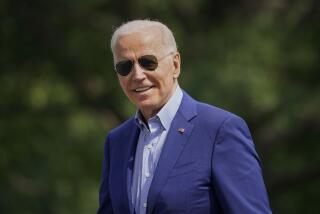Steep Hike in Excise Taxes Backed by Administration
WASHINGTON — Sailing against a storm of opposition that has united industry and labor groups, the Reagan Administration Monday endorsed steep increases in excise taxes on tobacco, alcoholic beverages and motor fuels to help finance federal income tax revision.
In testimony to the Senate Finance Committee, J. Roger Mentz, assistant Treasury secretary for tax policy, offered qualified support for a controversial plan by panel Chairman Bob Packwood (R-Ore.) to raise $75 billion in three years by eliminating the ability of businesses to deduct excise taxes from the amount of taxable corporate income.
But Mentz was careful not to endorse Packwood’s non-deductibility plan as written. Noting that the committee chairman’s proposal would amount to a 54% across-the-board increase in all excise taxes, Mentz recommended instead that some increases in certain excise taxes should “be given a long, hard look by the committee.”
“The Administration will entertain the possibility of selective increases in excise taxes to create a revenue-neutral package,” Mentz said. “We would have a problem supporting a 54% across-the-board increase in excise taxes.”
But Sen. David Pryor (D-Ark.), a strong opponent of the Packwood proposal, told Mentz: “I think your position is very tortured.” Committee observers believe that a solid majority of the panel would vote down the Packwood plan as proposed.
Mentz’s testimony was offset by that of industries, labor and special-interest groups that were almost unanimously opposed to the proposed increases. Officials testifying on behalf of the tobacco, wine, beer, distilled spirits and petroleum industries claimed to represent “the most heavily taxed” industries in the nation.
Moreover, representatives of labor and tax revision groups argued that the sweeping increases in excise taxes that would result from Packwood’s proposal would fall most severely on lower-income taxpayers and consumers.
The Administration, while clearly uncomfortable about the broad reach of Packwood’s plan, has been moving toward support of higher excise taxes on some products if Senate tax revision drafters find no other source of revenue to offset lower personal and corporate income tax rates.
Asked by reporters to assess the prospects of a modified excise tax increase along the lines that the Treasury Department now proposes, Packwood said that the key question is how “to get the $100 billion to reach the goals we have to reach” in any tax overhaul package.
More Public Sessions
Packwood said that he intends to continue public sessions to explain the tax package in detail during the next week or so but will hold off any votes to alter the bill until after private committee consultations that he deems necessary to save the much-amended plan from legislative strangulation.
In a related development Monday, Senate Majority Leader Bob Dole (R-Kan.) told a group of reporters that the bill “needs a transfusion” to remain alive and that there is only a “50-50 chance it will be passed this year . . . but it won’t be tax simplification.” Some members of the Finance Committee, he said, “just don’t want a tax bill.”
Mentz, seeking to justify higher taxes on gasoline and diesel oil, said that market prices, “particularly at current depressed levels, do not fully reflect the social costs of producing or consuming these products,” such as air pollution and other public health factors.
He maintained that even if the proposed 54% excise tax increase were passed along to the consumer, cigarettes at $1.05 a pack would only rise about 9 cents, beer at $3.21 per six-pack would rise about 10 cents and gasoline at 91 cents a gallon would rise about 4 cents.
Sen. Russell B. Long (D-La.) said that “it seems to me most of these are products you’re better off without. You don’t have to buy, unless you’re addicted to it.”
Not surprisingly, industry representatives disagreed. August A. Busch III, representing Anheuser-Busch and the beer industry, expressed concern about the regressive impact of higher beer taxes, noting that “80 million working Americans drink beer for social relaxation and personal enjoyment”--a product, he added, that in moderation prolongs life.
More to Read
Get the L.A. Times Politics newsletter
Deeply reported insights into legislation, politics and policy from Sacramento, Washington and beyond. In your inbox three times per week.
You may occasionally receive promotional content from the Los Angeles Times.










